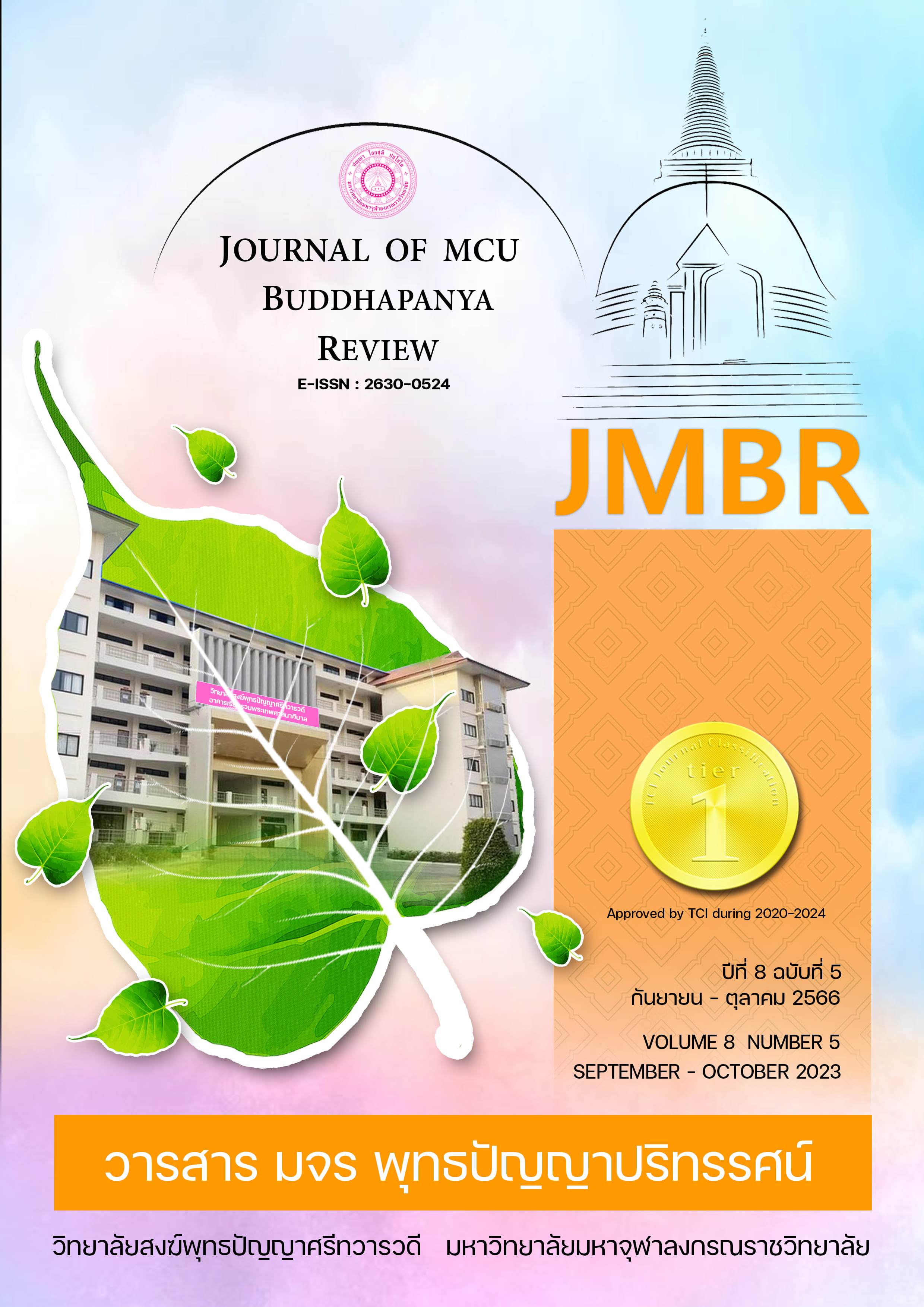รูปแบบการพัฒนาภาวะผู้นำยุคดิจิทัลของครูโรงเรียนประถมศึกษาในภาคตะวันออกเฉียงเหนือ
คำสำคัญ:
รูปแบบการพัฒนา; , ภาวะผู้นำดิจิทัล; , โรงเรียนประถมศึกษา.บทคัดย่อ
การวิจัยครั้งนี้มีความมุ่งหมายเพื่อ 1) ศึกษาองค์ประกอบภาวะผู้นำยุคดิจิทัลที่เหมาะสมของครู 2) สร้างและพัฒนารูปแบบการพัฒนาภาวะผู้นำยุคดิจิทัลของครู 3) ศึกษาประสิทธิผลรูปแบบการพัฒนาภาวะผู้นำยุคดิจิทัลของครูโรงเรียนประถมศึกษาในภาคตะวันออกเฉียงเหนือ พัฒนาโดยการทดลองใช้กระบวนการวิจัยและพัฒนามี 3 ระยะ รวม 7 ขั้นตอน กลุ่มตัวอย่างในการศึกษาภาวะผู้นำยุคดิจิทัลเป็นครูผู้สอนในโรงเรียนประถมศึกษาในภาคตะวันออกเฉียงเหนือ ปีการศึกษา 2564 ใช้การสุ่มหลายขั้นตอนโดยใช้โรงเรียนเป็นหน่วยวิเคราะห์ ได้กลุ่มตัวอย่าง 375 คน ผู้ให้ข้อมูลหลักคัดเลือกแบบเจาะจง คือ ครูโรงเรียนประถมศึกษาในศูนย์เครือข่ายการศึกษาขั้นพื้นฐานที่ 5 สำนักงานเขตพื้นที่การศึกษาประถมศึกษาสกลนคร เขต 2 จำนวน 20 คน เครื่องมือที่ใช้คือ แบบสัมภาษณ์ แบบสอบถาม และแบบประเมินพฤติกรรม สถิติที่ใช้ในการวิเคราะห์ข้อมูล ได้แก่ ค่าร้อยละ ค่าเฉลี่ยและส่วนเบี่ยงเบนมาตรฐาน
ผลการวิจัยสรุปได้ดังนี้ องค์ประกอบภาวะผู้นำยุคดิจิทัลของครูโรงเรียนประถมศึกษา ประกอบด้วย 4 องค์ประกอบหลัก 16 องค์ประกอบย่อย และ 60 ตัวบ่งชี้ ดังนี้ 1) ความรู้ความสามารถในการสอน มี 7 องค์ประกอบย่อย 15 ตัวบ่งชี้ 2) การมีทักษะและความรู้ดิจิทัล มี 4 องค์ประกอบย่อย 15 ตัวบ่งชี้ 3) ความสามารถในการใช้เทคโนโลยีดิจิทัลในการจัดการเรียนการสอน มี 2 องค์ประกอบย่อย 15 ตัวบ่งชี้ และ 4) การรู้เท่าทันการเปลี่ยนแปลงเทคโนโลยีดิจิทัล มี 3 องค์ประกอบย่อย 15 ตัวบ่งชี้ รูปแบบการพัฒนาภาวะผู้นำยุคดิจิทัลของครูโรงเรียนประถมศึกษาในภาคตะวันออกเฉียงเหนือ ประกอบด้วย หลักการ วัตถุประสงค์ เนื้อหา กระบวนการพัฒนา สื่อ/แหล่งเรียนรู้ การวัดและประเมินผล ส่วนการประเมินประสิทธิผลของรูปแบบการพัฒนาภาวะผู้นำยุคดิจิทัลของครูโรงเรียนประถมศึกษาในภาคตะวันออกเฉียงเหนือ ความเหมาะสมของรูปแบบการพัฒนาภาวะผู้นำยุคดิจิทัลของครูโรงเรียนประถมศึกษาในภาคตะวันออกเฉียงเหนือ โดยรวมอยู่ในระดับระดับมากที่สุด (X ̅= 4.67) และมีค่าดัชนีประสิทธิผล (Effectiveness Index: E.I.) ของการพัฒนาภาวะผู้นำยุคดิจิทัลของครูโรงเรียนประถมศึกษาในภาคตะวันออกเฉียงเหนือ มีการพัฒนาสูงกว่า ระยะก่อนการปฏิบัติการ มีค่าเฉลี่ยคิดเป็นร้อยละ 70
เอกสารอ้างอิง
Constitution of the Kingdom of Thailand B.E. 2560. (2017). Thai Royal Gazette. Volume 134 Chapter 82 A.
Strategy, N. (2018-2037). (2018). Thai Royal Gazette. Volume 135 Chapter 82 A.
a promsin,R.(2016). A Model for Developing Teacher Leadership in Primary Schools Under the Office of Education Region 11. Doctor of Education. Sakon Nakhon Rajabhat University.
Laoreandee, W. (2012). Thinking Skills Instructional Models and Strategies. (9th ed). Silpakorn University: Nakon Pathom.
Laoreandee, W. (2013). Science of Supervision, Teaching, and Coaching. Professional development: theory, strategy, practice. 12th edition, revised edition Nakhon Pathom.
Phengsawat, W. (2010). Applied Statistics for Social Science Research. Bangkok: Suwirisan.
Sararattana, V. (2014). Leadership, current contemporary theories, and perspectives. Thipayawisut Ltd., Part: Bangkok.
Sanrattana, W. et al. (2018). Leadership for The 21st Century. Journal of Education Naresuan University, 20(1), 261-271.
Ratanit, S. (2013). Principles, theory, and practice of educational administration. (4th ed.). Pimdee Co., Ltd.: Bangkok.
Government and Civil Service Office. (2017). Digital skills of civil servants and government personnel for digital government transformation. Bangkok.
Office of the Civil Service Commission (2017). Guidelines for developing digital skills of civil servants and government personnel for digital government transformation. Nonthaburi.
Chamchoy, S. (2017). School Administration in the Digital Era. (1st ed.). Phitsanulokdotcom: Phitsanulok.
Ministry of Information and Communication Technology. (2017). Digital Development Plan for Economy and Society. (1st ed.). Ministry of Information and Communication Technology: Bangkok.
Ministry of Education. (2002). The National Education Act, 1999, amended (2nd edition) 2002 and (3rd edition) 2010. Royal Thai Government Printing: House Bangkok.
Phromsri, C. (2014). Contemporary Leadership. Panichon Publishing House: Bangkok.
Phromsri, C. (2018). Leadership for Organizational Executives. Punyachon Publishing: Bangkok.
Pongsiri, N. (2017). Digital Leader in the Digital Economy Era. HR Society Magazine, 15(172), 20 - 23.
Boontham, T. (2016). Leadership in the Digital Economy Era and Sustainable Development of Educational Organizations. King Mongkut's Journal of Industrial Education, North Bangkok, 7(1), 217.
Summapan, N. (2009). Leadership: The Power to Drive Organizations to Excellence. (5th ed.). National Productivity Institute: Bangkok.
Wiwatpanich, N. (2015). The development of social media literacy skills. Graduate Studies Journal Valaya Alongkorn Rajabhat University Nationals, 9(3), 209 - 219.
Digital Development for Economy and Society Act B.E. 2560. (2017). Royal Gazette. Volume 134, Chapter 10 Kor. 24 January 2017.
Joyce, B. & Weil, M. (1985). Models of teaching. (2nd ed.). New Delhi: Prentice–Hall.
Nahavandi, A. (2015). The Art and Science of Leadership (7thed.). Pearson Education Limited. The USA. 288,352
Srisaard, B. (2010). Principles of research. (10th ed.). Surivitayasarn: Bangkok.
Pakotang, J. (2018). Digital Leadership for Professional School Administrators. Ubon Ratchathani Rajabhat University.
ดาวน์โหลด
เผยแพร่แล้ว
รูปแบบการอ้างอิง
ฉบับ
ประเภทบทความ
สัญญาอนุญาต
ลิขสิทธิ์ (c) 2023 วารสาร มจร พุทธปัญญาปริทรรศน์

อนุญาตภายใต้เงื่อนไข Creative Commons Attribution-NonCommercial-NoDerivatives 4.0 International License.



